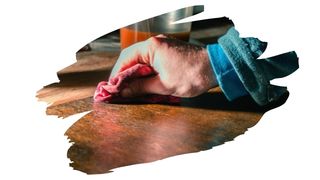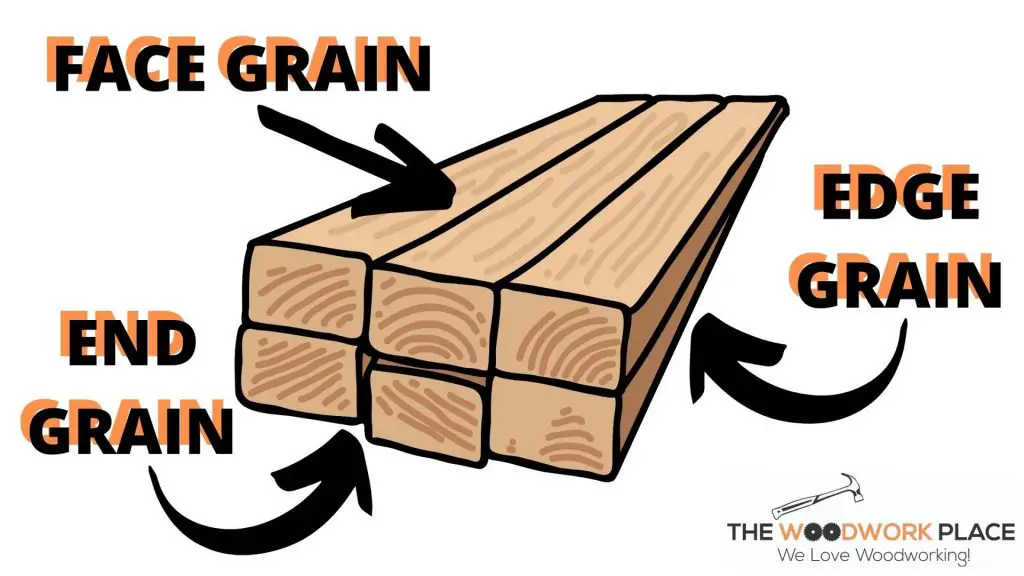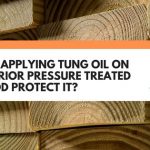When it comes to combining natural looking wood finish with water-resistance, there seems to be no-one else that does it quite as well as Rubio Monocoat.
This wood protector can handle water spills and stains. But where it really stands heads and shoulders above the rest is in its curing time.
The Rubio Monocoat with Accelerator product will cure in under a week. And thanks to its accelerator additive, application time of this wood finish is so much faster than using a natural oil, such as Tung oil.
Now, pure Tung oil is a natural drying oil finish that protects wood – one wood fiber at a time. As a time-honored finishing choice, it is well known for beautifying wood grain in a way that synthetic finishes don’t.
But, this oil likes to take its time when it comes to drying and curing into its final hard-resinous form.
So, how does Rubio Monocoat measure up when we compare it to the all natural Tung oil finish?
For example, the time it takes to dry is just one pointed area of finishing that we need to think about. So, let’s dive right into it..

This post may contain affiliate links to products that we receive a commission for (at no additional cost to you). Learn more here.
Rubio Monocoat vs Tung Oil for Waterproofing
The key purpose of wood finish is to protect wood from rot and decay. But, generally wood finishes aren’t waterproof, which is why they often require some kind of more durable sealing top coat.
Think of a wood finish as being more of a water-repellent resin than a waterproof seal.
So, Is Tung Oil Even Waterproof?
Pure Tung oil is very water-repellent.
Which means it can handle water spills easily. But it can’t handle a regular dousing of rain or sea-salty water (at least not without needing a regular touch up just to keep it going).
You see, Tung oil waterproofs by making it hard for water to swell up wood fibers. It does this by soaking into wood and coating those fibers with a hard resin.
So Tung oil can help prevent wood from warping or rotting away. But it is not 100% waterproof. The closest you can get to a completely waterproof sealer is by using something like Epoxy.
Now, having said that, you can by Tung oil blends that have waterproof sealant additives in them.
In fact, a lot of Tung oil products on the shelves today don’t even contain any Tung oil in them. Instead, they are a blend of varnishes and other things.
These faux-Tung products offer more water-resistance than pure Tung oil, but they too will likely need a topcoat to make them truly waterproof.
Does Rubio Monocoat Waterproof Wood?
First off, this hard-wax product works by penetrating wood, protecting it inside and out.
However, it does not build up much of a film on the surface of lumber. And this should come as no surprise since wax finishes don’t build up film anyway.
And, while it is arguably more water-repellent than Tung oil, it is still not 100% waterproof. In other words, this stuff can handle a few spills here and there, but not regular drenchings of H2O.
Is Tung Oil Good For Outdoor Furniture? It is good for both indoor and outdoor furniture. But, if you are using it on outdoor furniture, it will need an additional top coat sealant to help make it wholly weatherproof.
Rubio Monocoat vs Tung Oil for Durability
Another thing we need to think about is everyday wear and tear.
Dents and dints are a fact of life. And any wooden surface that sees a lot of use is going to get a few scrapes here and there. So how do these two finishes handle it all?
Is Rubio Monocoat Scratch Resistant?
It is definitely more scratch resistant than Tung oil due to its softer nature.
Scratches occur more often on brittle resins because these unyielding films have next to no give. While softer films, like wax finishes, have a bit of elasticity to them.
Thanks to the waxy nature of Rubio Monocoat, it can handle minor scratches really well since it can ‘bend’ to take them. It can even be used as wood filler, packing in cracks and gaps all along the face grain of lumber.

But, when it comes to Tung oil, it’s stiffer film doesn’t shrug off even minor abrasions as well. So it isn’t as scratch proof as Rubio Monocoat.
Rubio Monocoat vs Tung Oil for Appearance
So we know what these two finishes will do to wood on the inside. But how will they make wood look on the outside?
Does Rubio Monocoat Yellow Over Time?
Wax finishes in general don’t suffer from yellow discoloration like many oil finishes do (such as Linseed oil). And Rubio Monocoat is no exception.
Instead, this stuff can be buffed out into a shiny finish that doesn’t blemish the natural coloring of wood.
Does Tung Oil Turn Wood Yellow Over Time?
While a lot of oils can go through yellow-aging, such as Linseed oil and Danish oil, Tung oil is not one of them.
That is because Tung oil is a clear coating substance that’ll simply leave behind a matte/satin coat.
But Will Tung Oil Darken Wood?
Well, all oil finishes darken wood somewhat. Similar to how bare wood darkens slightly when water dampens it, so does oil cause a similar deepening in wood grains color.
But, pure clear Tung oil does not darken wood beyond that.
However, it is worth pointing out that this is only true of pure Tung oil. Not all Tung oil products are made of Tung oil. So the ingredients in these alternative Tung finishes can cause wood to darken.
To Wrap Up…
Honesty, both Rubio Monocoat and Tung oil are equally suitable as wood finishes. And this is mostly because they give you a slightly different end product.
In other words, which one you choose ultimately boils down to the kind of finishing appearance you are aiming for;
- For a satin finish, you should go with Tung oil – and be patient with waiting out its long curing time.
- For a shiny sheen on the surface, you can go ahead and rub in some Rubio Monocoat.



